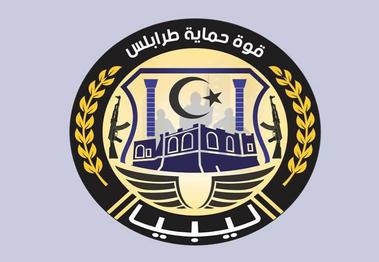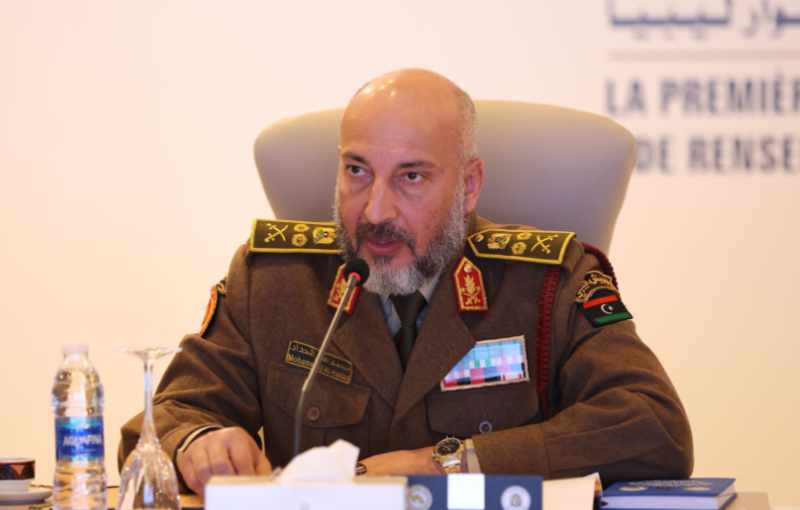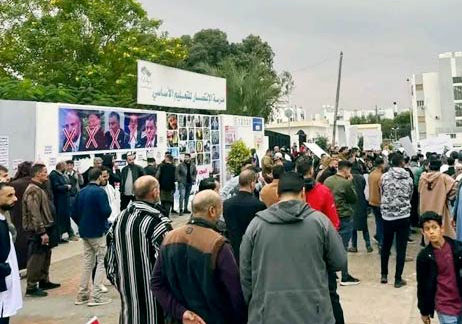
LAAF’s Lt-Gen Saddam Haftar meets Chief of Staff of Turkish Land Forces, Lt. Gen. Selçuk Bayraktaroğlu
Lt-Gen Saddam Haftar (b.1991) — who is the Khalifa Haftar’s youngest son, likely heir, and chief of staff of the Libyan Arab Armed Forces’ (LAAF) ground forces — visited Türkiye in April. It was his second visit in six months having been in Istanbul for October 2024’s SAHA EXPO Defence and Aerospace Exhibition when he met Turkish Defence Minister, Yaşar Güler.
This latest visit was, however, far more symbolic. Haftar was given a formal welcome complete with a reception ceremony that included a guard of honour and that was attended by the most senior army leaders. He held official meetings with his Turkish counterpart, the Chief of Staff of Turkish Land Forces, Lt. Gen. Selçuk Bayraktaroğlu (b.1961) at the land forces’ headquarters in Ankara. He also met Güler again and discussed ‘ways to enhance co-operation between the two countries’, as well as a number of regional and international issues of common interest.
Ankara therefore appeared to not only recognise Saddam Haftar but also the LAAF as a legitimate professional armed force. This marks a major coup for his father because it gives him further legitimacy and recognition. While the LAAF has been recognised officially by Russia and Belarus, having Türkiye on side in this way as well is a significant boost.
The visit notably occurred on the sixth anniversary of Haftar’s unsuccessful 2019 siege of Tripoli when the LAAF and Türkiye were on opposing sides. The timing of the latest visit was therefore interpreted as a way for Ankara to send the message that it is ready to overcome their previous difficulties and to build a new relationship with Haftar and his forces. Ankara’s relations with Libya have moved on considerably from that time and it has made a concerted effort to cultivate links to the eastern authorities as a means of rebalancing its relations with the country as a whole.
According to several media reports, Saddam Haftar signed a number of military agreements with his Turkish counterparts. THS Haber claimed that these included an agreement to initiate discussions over the LAAF’s purchasing of Turkish weapons and military equipment, including unmanned aerial vehicles (UAV). There were also plans to: train 1500 LAAF me ne this year alone; assist with military infrastructure development needs; and conduct joint naval training along Libya’s eastern coast. THS Haber said that
An official signing ceremony is due to take place in Benghazi soon. One will reportedly permit the presence of Turkish forces in areas under the LAAF’s control. The latter has been unforthcoming about the agreements although this is nothing unusual. It is, however, clear that Ankara is keen to engage militarily with the LAAF and via Saddam Haftar.
This rapprochement reflects Ankara’s very pragmatic desire to engage with both camps. This is not least because of the available economic opportunities in the east at a time when the eastern authorities are channelling so much effort and money into reconstruction efforts. Ankara has certainly shown a willingness to work with the Development and Reconstruction Fund, headed by Belgasim Haftar, and Turkish companies are taking part in the rebuilding of Derna and Benghazi. They were also involved in the construction of the large new international stadium which was recently inaugurated in Benghazi.
This month Belgasim Haftar signed 12 contracts with Libco Insaat and Cevahir Yapi and Jawaher Contracting, Construction, Industry & Trade for new development projects in Benghazi, al-Bayda, Shahat (a.k.a. Cyrene), and Tobruk. Meanwhile, Turkish Airlines are also increasing their flights to eastern Libya.
Ankara also has an interest in maintaining good relations with the eastern authorities in relation to the November 2019 maritime demarcation Memorandum of Understanding (MoU) it signed with the previous internationally recognised Government of National Accord (GNA) in Tripoli in 2019. The eastern authorities rejected this agreement, which established an Exclusive Economic Zone (EEZ) in the Mediterranean Sea (Libya Focus, December 2019). In order to fulfil its Mediterranean ambitions Türkiye needs to get eastern Libya on side in relation to the agreement.
Inviting Saddam Haftar to Ankara was a further step in its efforts to bring the LAAF onside. However, this blossoming relationship is not without its constraints. Cairo may well have been supportive of the visit which reflects the improved nature of Egyptian-Turkish relations in more recent years. It will, however, be less comfortable with the idea of Ankara having greater influence in eastern Libya, and especially on the military front. Egypt will therefore ensure that this relationship has its limits.
Russia will remain similarly wary of Turkish ambitions in the region. It may not have objected to Saddam Haftar’s visit or to the general principle of improved relations between Ankara and the LAAF, but Moscow is not going to want to see unchecked Turkish influence in the east. Both Cairo and Moscow will therefore impose constraints on Khalifa Haftar who, in any case, is only going to allow Türkiye so much space.
Ankara’s rapprochement with Haftar does not mean it is going to abandon the GNU Prime Minister Abdelhamid Dbeibah or the western camp. Türkiye remains deeply invested in western Libya, not only economically, but also militarily, where it has had a major presence and influence, particularly since 2019. Rather, it is trying to keep both camps on side in order to project its influence and expand its control. In mid-April it hosted a high-level GNU delegation led by the head of military intelligence, Mahmoud Hamza. It met the army’s Chief of Staff, Deputy Chief of Staff and Director of Military Intelligence with discussions focused on strengthening military and security co-operation, including through training programmes and capacity building.
Türkiye is clearly intent on playing to both sides and its olive branch policy towards the east will continue.
This excerpt is taken from Libya Focus, our monthly intelligence report on Libya. Click here to receive a free sample copy.The April 2025 issue of Libya Focus also includes the following:
Politics
- Central Bank of Libya devalues the Libyan Dinar…
- Implications
- Saddam Haftar consolidates ties with Türkiye…
- Competition over the Libyan Audit Bureau
Security
- Anxiety in Tripoli as Misrata’s Joint Operations Force mobilises…
- Internal Security Apparatus clamps down on NGOs…
Energy & Economy
- NOC goes on public tender tour



